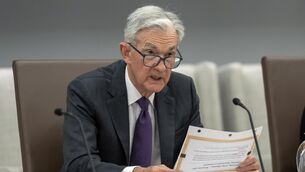Jim Power: Weak dollar adds to challenges for the EU — including Ireland

When Donald Trump took office in late January, the dollar was trading around $1.0250 against the euro. Today it is trading just under $1.18 — an appreciation of over 15% in the value of the euro.
As we approach the end of the first six months of US president Donald Trump’s second coming, we can conclude that it has been dramatic, chaotic, uncertain, volatile — or whatever other adjective one chooses.
However, the significant decline in the value of the dollar has been one of the most noteworthy developments.
One might be tempted to conclude that the descent of the dollar is indicative of failure and a loss of confidence in its primacy, but this is exactly what Mr Trump set out to do.
Mr Trump seems to be forcing the US’s trading partners into a ‘Mar-a-Lago accord', which is the idea that the US could compel other countries to accept a weaker dollar and lower interest rates on their US Treasury investments in order to be still protected by the US security umbrella.
This has shades of the ‘Plaza Accord’ of 1985, where the UK, France, West Germany, and Japan agreed to work with the US to weaken the dollar.
The reason Mr Trump wants a weaker dollar is because he believes that the strong dollar has contributed to the demise of the ‘American dream’ through the dismantling of the US manufacturing base and the loss of blue-collar jobs.
His logic is that the reserve currency status of the dollar has damaged the US export base and forced the US to become dependent on imports, and hence become increasingly dependent on the outside world.
He has set out to change this and is doing everything in his power to weaken the currency.
He is succeeding.
When he took office in late January, the dollar was trading around $1.0250 against the euro and, today, it is trading at just under $1.18, which is equivalent to an appreciation of about 15% in the value of the euro against the US unit.
This will obviously make eurozone exports to the US much less competitive and will make imports into the US that much more expensive.
The big issue overlying all of this is that next week we may get some clarity on the tariff regime between the EU and US — and while a decision might be postponed further, there is a growing sense that 10% tariffs could apply on EU exports to the US eventually.
This would not be a bad outcome, given how much worse it might be.
However, if a 10% tariff is combined with a currency appreciation of approximately 15%, it would make EU exports to the US significantly less competitive.
Mr Trump’s hope is that this will force US consumers and businesses to substitute imports with domestically produced goods.
As a key exporter to the US, the challenges for Ireland are clear.
While there is massive global criticism of Mr Trump’s policies, the US economy is still significantly outperforming the eurozone, with employment data last week showing that the labour market remains buoyant.
Furthermore, data published last week shows that in May, the US collected $24.2bn (€20.5bn) in tariff revenues, which is almost four times higher than a year ago.
All of this adds up to the possible conclusion that not alone is Mr Trump getting everything he wants, but the policies may be working for the US.
It is still too early to jump to any definitive conclusions, but the omens so far will certainly please Mr Trump.
For the European Central Bank, there is now a growing concern that the appreciation of the euro will be very deflationary, with the risk that inflation might significantly undershoot the 2% rate.
The only way to respond to that would be to cut interest rates further, so the outlook for Irish borrowers might just get better over the coming months.














